Native Nations Events
Addressing critical public policy issues facing Native tribes through timely programs.
The Native Nations Law & Policy Center offers many events that address critical public policy issues facing Native tribes.
To stay up to date with plans for future events, contact nativenationslaw@law.ucla.edu.
Event Recordings
-
2023 Events
Debrief of the Decision in Arizona v. Navajo Nation Case
June 26, 2023
Watch video here
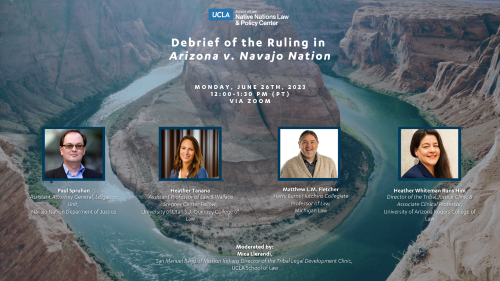
The 5-4 decision in Arizona v. Navajo Nation (2023) ruled that the United States does not have a treaty or trust obligation to identify or account for tribal water rights. The Native Nations Law and Policy Center hosted a panel on June 26, 2023. The expert panelists gave insight on the majority and dissenting opinions, arguments, historical precedent, and the impact of the ruling on treaty rights. The panelists included:
Paul Spruhan — Assistant Attorney General, Litigation Unit, Navajo Nation Department of Justice;
Heather Tanana — Assistant Professor of Law & Wallace Stegner Center Fellow, University of Utah S.J. Quinney College of Law;
Matthew L.M. Fletcher — Harry Burns Hutchins Collegiate Professor of Law, Michigan Law;
Heather Whiteman Runs Him — Director of the Tribal Justice Clinic & Associate Clinical Professor, University of Arizona Rogers College of Law.
The discussion was moderated by our own Mica Llerandi, San Manuel Band of Mission Indians Director of the Tribal Legal Development Clinic
Unpacking Brackeen v. Haaland
June 20, 2023
Watch video here
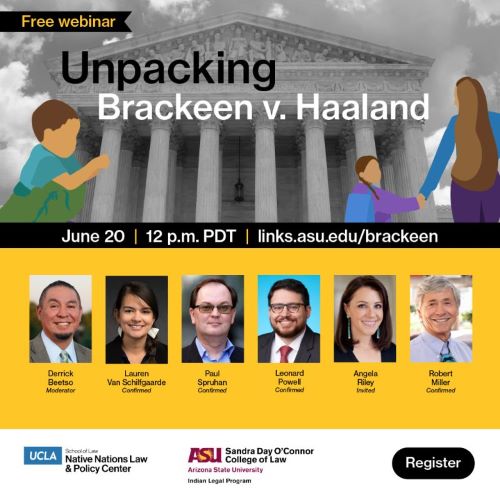
The Native Nations Law and Policy Center at UCLA partnered with the Indian Legal Program at Arizona State University's Sandra Day O'Connor College of Law to bring you, "Unpacking Brackeen v. Haaland". Leading experts in Indian law analyzed and discussed the U.S. Supreme Court’s 7-2 ruling which determined the future of the Indian Child Welfare Act. We were joined by:
Paul Spruhan, Assistant Attorney General, Litigation Unit, Navajo Nation Department of Justice;
Leonard Powell, Associate, Jenner & Block;
Robert J. Miller, Professor of Law at ASU Sandra Day O’Connor College of Law;
Lauren van Schilfgaarde, Assistant Professor of Law, UCLA School of Law
The discussion was moderated by Derrick Beetso, Director, College of Law, Indian Gaming and Self-Governance, Sandra Day O'Connor College of Law
From the Frontlines- Saving Indigenous Sacred Sites: Oak Flat and Beyond
May 17, 2023
Watch video here
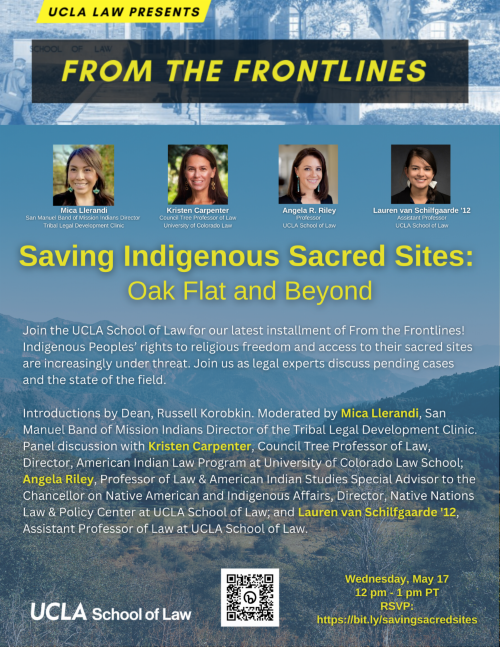
Indigenous Peoples’ rights to religious freedom and access to their sacred sites are increasingly under threat. For this edition of From the Frontlines, Indian law experts discussed the pending Ninth Circuit Court of Appeals case involving Oak Flat and the state of the field involving sacred sites. UCLA School of Law, Dean Russell Korobkin, provided introductions and the expert panel included:
Angela Riley, Professor of Law & American Indian Studies Special Advisor to the Chancellor on Native American and Indigenous Affairs, Director, Native Nations Law & Policy Center at UCLA School of Law;
Lauren van Schilfgaarde, Assistant Professor of Law at UCLA School of Law; and
Kristen Carpenter, Council Tree Professor of Law, Director, American Indian Law Program at University of Colorado Law School
Debrief of the Oral Arguments in Arizona v. Navajo Nation Case
March 22, 2023
Watch video here
UCLA’s Native Nations Law and Policy Center, ACS, and NALSA held a panel to debrief the oral arguments from the Arizona v. Navajo Nation case. The case is of huge importance as the United States Supreme Court’s decision will address tribal water rights. Our panelists discussed what the case means for the future of tribal water rights, tribal sovereignty, and the future of the Colorado River.
To learn more about the case:
https://www.scotusblog.com/2023/03/supreme-court-justices-appear-divide…https://www.scotusblog.com/2023/03/as-drought-persists-in-the-west-just…
https://narf.org/scotus-az-v-navajo-amicus/
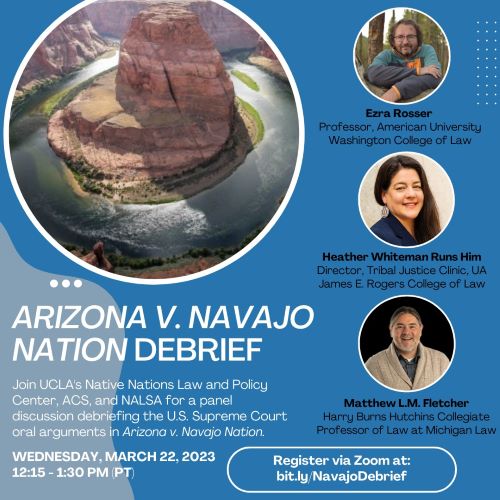
-
2022 Events
Debrief of the Oral Arguments in Haaland v. Brackeen
November 22, 2022
We held a debrief on Brackeen v. Haaland with the nation's leading experts, Maggie Blackhawk, Professor at NYU Law, Keith Harper, Chair of the Native American Law Practice at Jenner & Block, and Kate Fort, Director of the Indian Law Clinic at MSU School of Law. The panel was moderated by Lauren van Schilfgaarde, UCLA School of Law.
Watch the video of this event here.
To learn more about ICWA and the Brackeen v. Haaland, here are additional resources:
November 9, 2022 - Oral Arguments
Supreme Court Briefs (including amicus briefs) can be found on the TurtleTalk page.
This Land (Season 2) podcast explores the history of the case and background on ICWA challengers.
Selected media on the Brackeen Case:
The Supreme Court Case that Could Break Native American Sovereignty by Rebecca Nagel in The Atlantic.
The Fate of Indian Child Welfare Before the Supreme Court: Race, Commerce and Commandeering by Nancy Marie Spears in the Imprint
How a Chippewa Grandmother's Adoption Fight Ended Up in the U.S. Supreme Court by Nancy Marie Spears in the Imprint
In Arizona, small tribe watches warily as the Supreme Court takes up Native adoption law in Washington Post
For decades, welfare laws kept Native American families together. Will the Supreme Court end them? in the Guardian
UCLA Regents' Lecture: Tribal Leadership and the Future of Indian Country
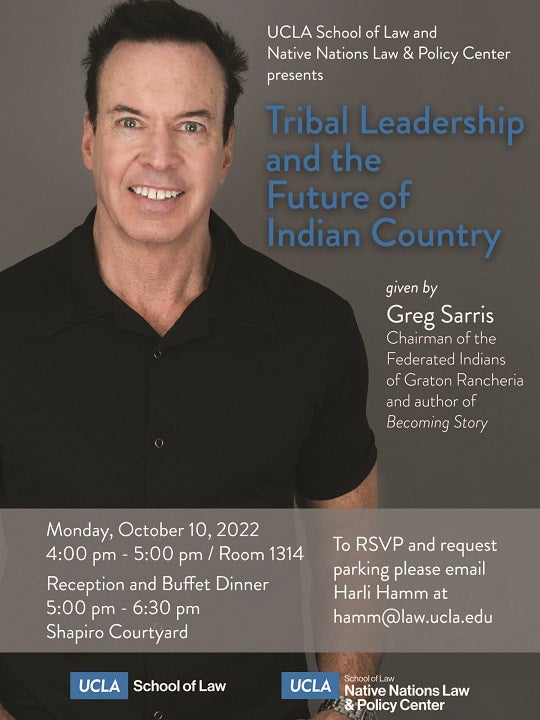
October 10, 2022
Castro-Huerta v. Oklahoma and the Attack on Tribal Sovereignty: Where do we go from here?
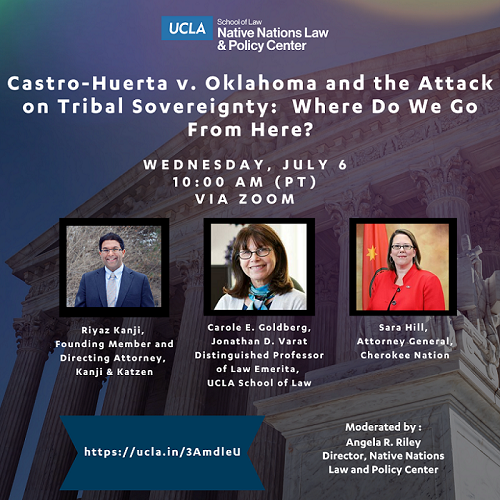
July 6, 2022
The Supreme Court upended two hundred years of settled law regarding criminal jurisdiction in Indian country last week in Castro-Huerta v. Oklahoma. In an opinion stemming from the McGirt case, the astonishing decision asserted that there is a presumption of state criminal jurisdiction that must be preempted in Indian country, undermining tribal sovereignty and threatening safety and security for Indian people. Join us for this webinar as we hear from the nation’s leading legal practitioners and scholars about how this case came to be and what we might expect in the wake of its holding.
Dobbs v. Jackson: The Impact on Native Reproductive Health
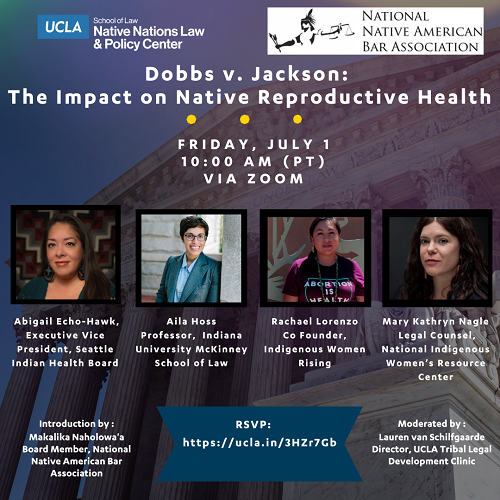
July 1, 2022
The impacts of Dobbs will be far-reaching and likely disproportionally include Native people. Native reproductive health has long been underserved, resulting from a cumulation of historically forced assimilation policies, under-resourced clinics and services, and devastating rates of violence and poverty. Yet, in many ways Native reproductive health has also been targeted. From coercive sterilization efforts through the 1970s to the continued application of the Hyde Amendment, Native people are likely the most in need of holistic, comprehensive healthcare, yet are the least likely to get it. Meanwhile, severe restraints on tribal powers limits the extent to which tribes can meaningfully self-determine their own care. This panel will begin to explore the ways in which the Dobbs decision impacts Native people, and the ways in which Native reproductive healthcare was already precarious.
Debrief of the U.S. Supreme Court's Opinion in U.S. v. Denezpi
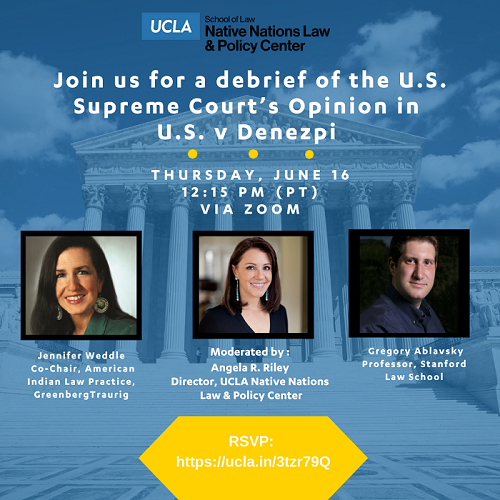
June 16, 2022
The nation’s leading Indian law lawyers debrief about the Supreme Court’s historic 6-3 decision in Denezpi v. United States.
Watch for an inside look at the historic case for the Ute Mountain Ute. Hear from the nation’s leading Indian law experts — Jen Weddle, counsel for the Tribal Governments, including Ute Mountain and the other CFR Tribes, and Professor Greg Ablavsky, an author of the Indian Law Scholars and Historians Amicus brief — as they dissect the opinion and give their insights as to what we might expect from the Supreme Court in Indian law cases going forward. You won’t want to miss this!
-
2021 Events
McGirt v. Oklahoma: Reflections on a Landmark Case and What We’ve Learned So Far
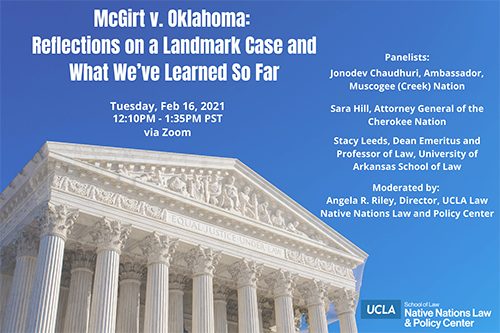
FEBRUARY 16, 2021
The groundbreaking case of McGirt v. Oklahoma (2020) altered the landscape of criminal jurisdiction within the Muscogee (Creek) Nation reservation. Join us for a provocative conversation with the legal pioneers working on the front lines for more than six months now and hear their reflections on both successes and on-going challenges.
Guest speakers: Jonodev Chaudhuri, Ambassador, Muscogee (Creek) Nation; Sara Hill, Attorney General of the Cherokee Nation; Stacy Leeds, Dean Emeritus and Professor of Law, University of Arkansas School of Law
Moderated By: Angela R. Riley, Director, Native Nations Law and Policy Center, UCLA School of Law
United States v. Cooley: Threats to Tribal Police Power and Native Governance
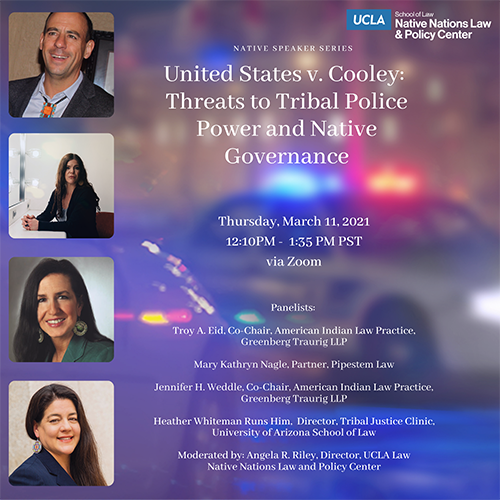
MARCH 11, 2021
On March 23rd the United States Supreme Court will hear oral arguments in US v. Cooley, a case addressing the scope of tribal police officers' power to temporarily detain and search non-Indians traveling through the reservation and suspected of violating state or federal law. Join us for a lively and gripping conversation with a remarkable panel of Indian country lawyers involved in the case as they discuss the legal and practical implications of Cooley's outcome for public safety on reservations.
Launch Event!
United Nations Declaration on the Rights of Indigenous Peoples: Tribal Implementation Toolkit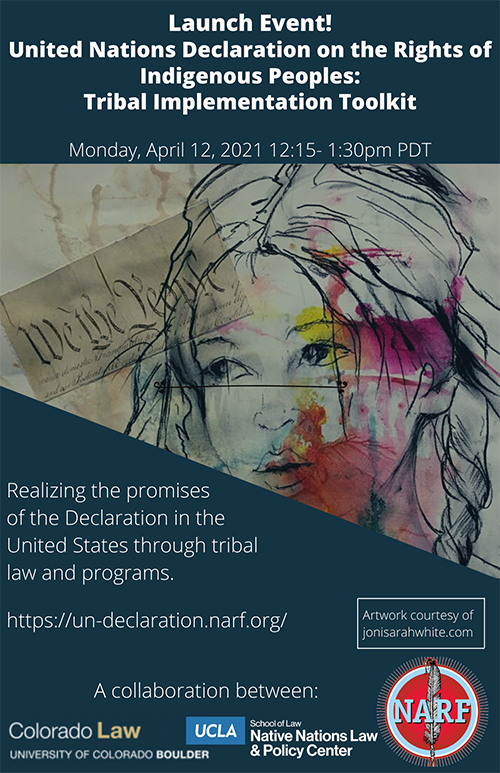
APRIL 12, 2021
The UN Declaration on the Rights of Indigenous Peoples is a standard-setting document that recognizes that Indigenous Peoples have rights to self-determination, equality, property, culture, religious freedom, health, and economic well-being, among many others. It calls on States to undertake legal reform that will remedy past violations and ensure current protections for Indigenous Peoples’ rights. The "Tribal Implementation Toolkit," produced in collaboration between the Native American Rights Fund, the University of Colorado Law School, and UCLA Law's Tribal Legal Development Clinic, considers how tribes can support and implement the Declaration through tribal lawmaking.
Learn more about the toolkit and the project to implement: https://un-declaration.narf.org/
Roundtable Debrief on the Cooley Oral Argument at the Supreme Court
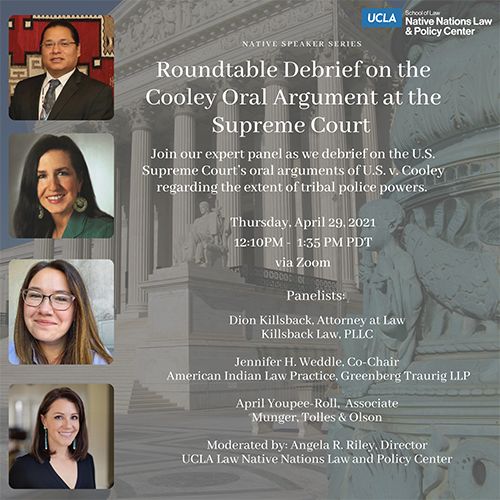
APRIL 29, 2021
Join our expert panel as we debrief on the U.S. Supreme Court’s oral arguments of U.S. v. Cooley regarding the extent of tribal police powers.
Book Talk: A Coalition of Lineages: The Fernandeño Tataviam Band of Mission Indians
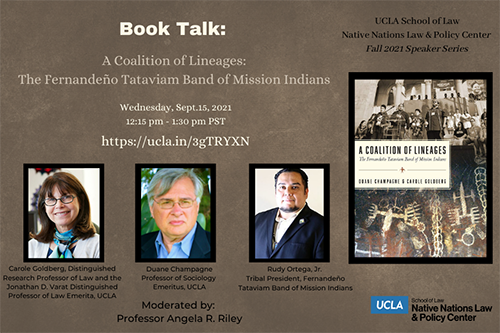
September 15, 2021
The Indigenous people who were brought to Mission San Fernando, northwest of present-day Los Angeles, came from autonomous, lineage-based villages, connected through ceremonies, trade, and intermarriage. Our new book, "A Coalition of Lineages," depicts the dispossession, attempted detribalization, persistence, and multicultural adaptations of these lineages, including formation of an overlapping Mission Indian identity and tribal organization. Although most histories of mission Indians end with the closing of the missions, our book presents powerful evidence that the Fernandeño tribal community has continued into the present. Even as a Tribe seeking federal recognition, the Fernandeño Tataviam Band of Mission Indians has successfully pursued economic development, social welfare for its members, and engagement with federal, state, and local governments.
You can purchase the book at https://uapress.arizona.edu/book/a-coalition-of-lineages
TLDC Highlight: The Need for Confidentiality within Tribal Cultural Resource Protection
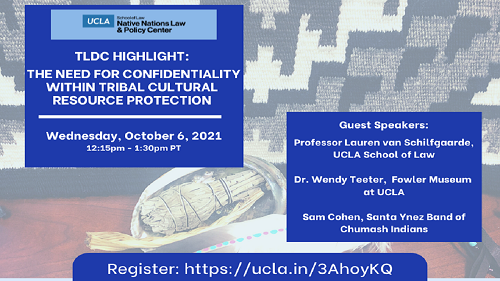
October 6, 2021
In going about the work of protecting cultural resources, tribes find themselves in a bind. The protection of one resource almost always requires the exchange of another: sensitive tribal information. Tribes are compelled to reveal a staggering amount of detail to trigger protection for their cultural resources. This compulsion to reveal sensitive information fails to respect Indigenous cultural, intellectual, religious, and spiritual assets. This panel will discuss the current framework of cultural resource protection, the limited means by which tribes can protect their sensitive tribal information, and the need for more enhanced confidentiality protections. Read the publication here.
NNLPC Fall 2021 Speaker Series: Indigenous Peacemaking at the Intersection of Law and Culture
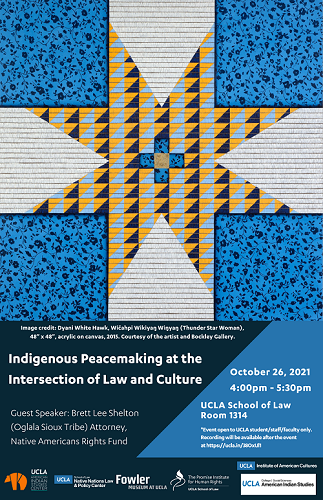
October 26, 2021
UCLA and UCLA Law hosted a lecture based on the twin premises: "Why do harms matter still today?" and "What does healing look like?" Interventions supporting community-driven healing programs that prioritize collective rights are not consistently supported under the Indian Child Welfare Act (1978) and the Native American Graves Protection and Repatriation Act (1990), as these legal tools have not resolved on-going conceptual issues of group rights, trauma, memory, and healing. Recognizing that truth needs to be told, and discomfort is a necessary part of healing, the speaker and hosts seek to understand more fully pathways for recognizing and addressing harms.
NNLPC Fall 2021 Speaker Series: The Ascension of Tribal Cultural Property Law
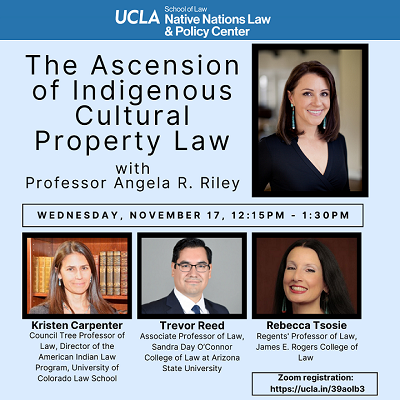
November 17, 2021
VideoThis panel was a conversation with leading Indigenous rights scholars who discussed the growing impact of tribal law on issues related to Indigenous Peoples’ cultural and intellectual property.
-
2020 Events
Tribal Legal Development Clinic Brown Bag Lunch Series
MAY 29, 2020
Indian Child Welfare Act Constitutionality and Litigation Trends
Kate Fort, Director, Indian Law Clinic, Michigan State University College of Law
VideoJUNE 5, 2020
Navajo and Hopi Families COVID-19 Relief Fund
Ethel Branch, Kanji & Katzen
VideoJUNE 12, 2020
Implementing the UN Declaration on the Rights of Indigenous Peoples
Kristen Carpenter, Council Tree Professor of Law, University of Colorado Law School
VideoJUNE 19, 2020
Intersection of Cultural Resource and Environmental Protection
Geneva E. B. Thompson, Associate General Counsel, Yurok Tribe
VideoJUNE 26, 2020
McGirt Debrief
Riyaz Kanji, Kanji & Katzen and Matthew L.M. Fletcher, Professor of Law, Michigan State University
VideoJULY 10, 2020
Advocating for Indian Country: Policy & Litigation
Derrick Beetso, General Counsel and Fatima Abbas, Director of Policy and Legislative Counsel, National Congress of American Indians
Video
Red Rising: Indigenous Peoples and Political Participation Series
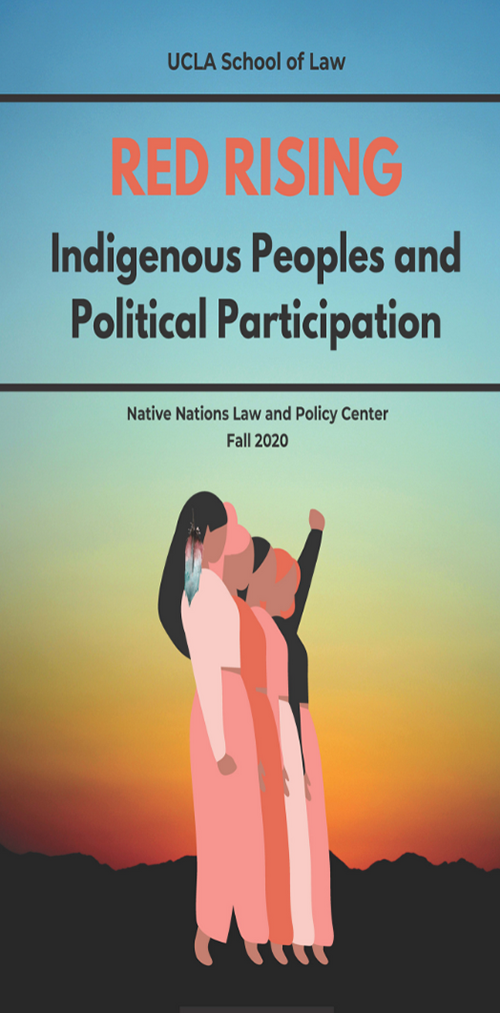
SEPTEMBER 9, 2020
McGirt v. Oklahoma: A Mvskoke Triumph
Moderated by Professor Angela R. Riley. Featuring: Ambassador Jonodev Chaudhuri, Ambassador, Muscogee (Creek) Nation; Professor Sarah Deer, Professor, University of Kansas; Dean Stacy Leeds, Dean Emeritus and Professor of Law at the University of Arkansas
VideoSEPTEMBER 17, 2020
The Execution of Lezmond Mitchell: Disdain for Life and Sovereignty
Moderated by: Professor Angela R. Riley. Featuring; Jennifer Denetdale, Professor of American Studies, University of New Mexico; Matthew L.M. Fletcher, Professor of Law, Michigan State University College of Law; Addie C. Rolnick, Professor of Law, University of Nevada, Las Vegas; Carl Slater, Navajo Nation Council Delegate
VideoOCTOBER 2, 2020
United Nations Declaration on the Rights of Indigenous Peoples
Moderated by Professor Angela R. Riley. Featuring: Kristen Carpenter, Council Tree Professor of Law & Director, American Indian Law Program, University of Colorado Law School; United Nations Expert Mechanism on the Rights of Indigenous Peoples; Walter Echohawk, President, Pawnee Business Council, Pawnee Nation of Oklahoma
VideoOCTOBER 15, 2020
Indigenous Representation in Political Systems
Representation is a core remedy for invisibility. This notably all-female panel will explore the barriers facing Indigenous women and political office, and the hope and tangible change that comes with piercing the representation ceiling. Representatives from both state and national offices will explore how their presence has impacted the offices they hold, and how, despite their constituency, they are called to represent all of Indian country.
Moderated by Professor Angela R. Riley. Featuring: Representative Sharice Davids; Representative Ruth Buffalo; Senate Candidate Paulette Jordan;Tribal Advisor Christina Snider
Video
